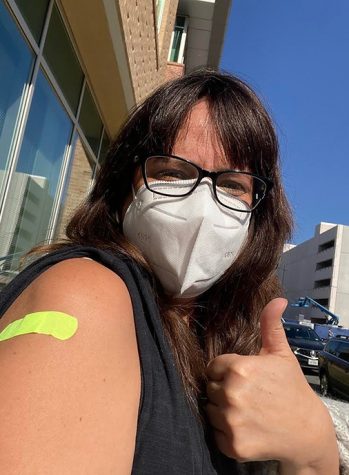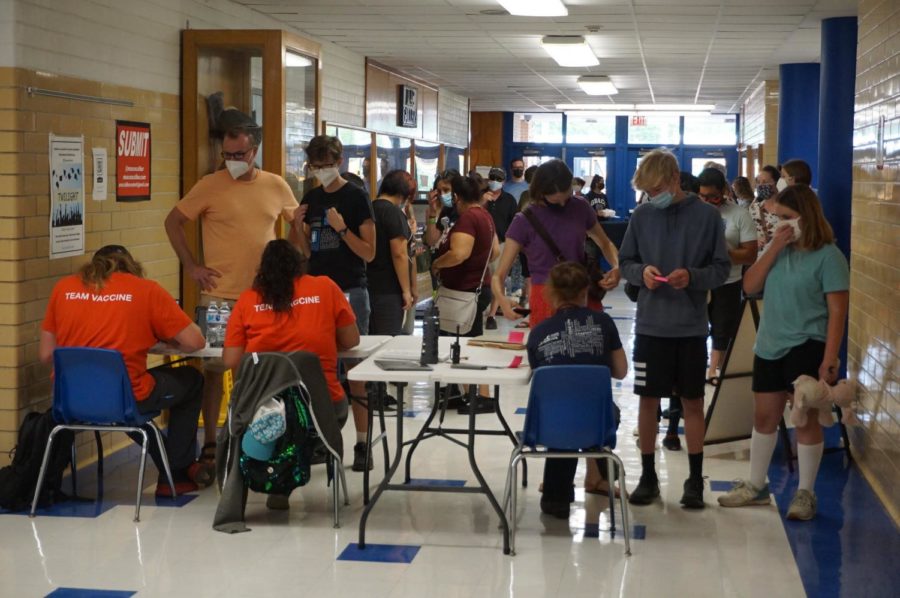A third does of the Pfizer-BioNTech COVID-19 vaccine was officially authorized for use in adults over the age of 65, immunocompromised individuals and essential workers by the FDA on Wednesday to provide an extra level of protection against the virus for high risk populations. Following the FDA’s approval, the CDC released a similar announcement on Thursday, recommending the shot for the same groups.
Ceramics teacher Corey West, who takes an immunosuppressive drug, received her booster shot the weekend before school started in August. She received her first dose in January of this year, but with the recent rise of the Delta variant and increasing local case numbers, the reassurance previously provided by her vaccine quickly wore off.
“There was like a blip in the summer where I thought being vaccinated was like ‘Yay! I’m free, everything’s good,’” West said, “but towards the end of the summer, that feeling of security disappeared.”
In addition the CDC also released data showing that immuno-suppressed people weren’t always building up the same immunity after being vaccinated as non-immunosuppressed people.
Michael Osterholm, Ph.D., is a Regents Professor at the University of Minnesota and the director of the Center for Infectious Diseases, Research and Policy. Osterholm explained in an exclusive interview with The Shield why the vaccine might be less effective for immunosuppressed individuals.
“The human immune system is a complex system of cells and chemicals that protect us from exposure to foreign material like an infectious agent,” Osterholm said. “It has a ‘long-term memory of previous exposures’ that ‘kicks in quickly’ when we are re-exposed to infectious agents. We use vaccines as noninfectious materials that can cause the body to develop a protective immune response to an infectious agent without the individual actually being infected. If one’s complex immune response is not functioning adequately, only partial protection against vaccine preventable infectious diseases may be provided.”
The possibility of having only partial protection against a virus that is reported as more severe in immunocompromised individuals creates uncertainty for a high-risk population.
“It was really scary, because it was like the week before school started, and I’m teaching an extra class, which I signed up to do, but thinking that I was vaccinated and safe,” West said. “So I have 230 plus students on my roster that I interact with every two days. So knowing that, and then having this idea that maybe my body wasn’t providing the antibodies that I needed to be safe, was like a panic. There was a visceral panic.”
An immunocompromised student source who wished to remain anonymous to protect their privacy echoed similar fears about going back to school with Austin rising to a Stage 5 COVID risk level.
“I started noticing getting that same tense feeling of ‘Oh, I’m worried about school and so many people,’” the student said. “I remember what it felt like when I first got vaccinated and how freeing it felt. I want to get back to just feeling comfortable in this environment and knowing that I’m safe.”

The student has not received their booster vaccine yet but hopes to as soon as possible.
“It’s just kind of isolating being immunocompromised,” the student said. “When my other friends are like ‘Oh, we’re young, if we get it, it’s not going to be a big deal. We’ll be fine.’ But I don’t know if I’d be fine. It’s scary to not have that be like known fact.”
An added challenge for this student during the pandemic has been maintaining connections with others while balancing safety.
“It’s been hard to have to be extra careful while also looking out for myself in a way where I’m being social and seeing friends and not feeling like I’m confined to my room,” the student said.
Navigating the risks of the pandemic can be difficult, especially for immunocompromised individuals in an ever changing environment.
“The unknown is the hardest,” West said. “Right now in my life, it’s knowing that I’m in a school where there’s cases happening, albeit not the majority of our population. But knowing how to navigate my personal life outside of school, like, how safe am I to be around my friends who have unvaccinated kids? Or my elderly mother? Just being a couple weeks into school, I don’t really have a good idea how to handle my personal life.”
Communication has become key in evaluating risk levels and assessing social situations.
“I think just checking in with people about the boundaries because now I feel like it’s kind of an assumed thing, like, ‘Oh, we can do whatever we want,’” the student said, “but if you’re going to hang out with someone, let them know if you’re vaccinated or not. Just being honest and transparent about where you’re at will make someone feel more comfortable to make the decision for themselves.”
Aside from open communication, people can help the immunocompromised population by following public health guidelines such as social distancing, wearing masks, and getting vaccinated.
“I don’t believe this additional dose of vaccine should be considered a booster dose,” said Osterholm, who was a member of Joe Biden’s COVID-19 Advisory Board during the presidential transition. “But rather as the third of a three prime series needed to provide adequate protection. This third dose causes the functioning aspects of the compromised immune response to improve.”
Vaccinations are a precaution that individuals can receive to protect themselves, but also impact the health of the larger global community.
“Realize that it’s not just you, that your actions or even your perceived freedom affects more than just yourself,” West said. “There’s a significant percentage of the population that has been vaccinated, and they’re okay. And it looks like this battle’s going to be longer and tougher than we even first anticipated. So help us out, get vaccinated.”
This story was originally published on The Shield Online on September 23, 2021.




































